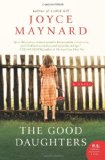Summary | Excerpt | Reading Guide | Reviews | Beyond the book | Read-Alikes | Genres & Themes | Author Bio

A Novel
by Joyce Maynard"One thing about a hurricane: it turns everything upside down. All you know for sure: the world will look different tomorrow."
So begins the story of two families, the Planks and the Dickersons, bound together by the birth of their daughters, the only two babies born on July 4th, 1950 in a small New Hampshire hospital. "Birth sisters" is how Connie Plank refers to her daughter Ruth and the other baby, Dana Dickerson; two girls with nothing in common, born into families as dissimilar as they could possibly be.
Joyce Maynard's ability to define her characters - their vulnerability, their dimensionality, their flaws their strengths, their resolve to do the best they can - grabs hold, completely captivating us. We follow the lives of both Dana and Ruth as chapters alternate between the two girls' voices, watching them grow from children into women.
Ruth Plank is the fifth daughter of Connie and Edwin, tenth generation New England farmers who take great pride in working land that has been in the Plank family since the 1600s. "My father was the oldest son of an oldest son. That's how the land had been passed down for all the generations. The farm now consisted of two hundred and twenty acres, forty of them cultivated, mostly in corn and what my father called kitchen crops that we sold, summers, at our farm stand, Plank's Barn. Those and his pride and joy, our strawberries." There is not a lot of money, but the land is owned free and clear.
Dana Dickerson's parents, Val, an artist, and George, a dreamer of big schemes who is sure that fame and fortune are just around the corner, are financially unstable, emotionally flighty and completely self-absorbed. Dana and her older brother Ray never refer to their parents as mom or dad but rather Val and George, and the roles of parent and child are often blurred. George's continual career ventures mean relocating on a regular basis.
Yet even after the Dickersons move away, these two families, sharing nothing more than the birth dates of their daughters, manage to stay in touch through Christmas cards and a quick yearly visit. The Dickersons usually stop by the Plank farm in early July, around the girls' birthdays, at the height of strawberry season.
Dana cherishes these visits, and at an early age she is deeply affected by the notion Ruth's father shares with her one day, that the only reliable things in life are the seasons and the crops. "Young as I was, hearing him say this moved me. Some part of me admired the Plank family's steadiness and constancy, the order of their lives unfolded, particularly measured against the untidiness of our own. I loved the idea that a handful of corn seeds, properly planted and tended, would lead to tall, straight stalks, and food." Dana, pragmatic and sensible, with her love of the land and the feel of soil between her fingers feels disconnected and removed from both of her own parents.
Ruth, so unlike her older sisters, struggles to please her disapproving mother. While her father, Edwin, takes great pride in his daughter's artistic ability and loves her wholeheartedly, her mother is dismissive and remote towards her. What affection Connie shows Ruth feels forced and wooden.
As Dana and Ruth discover and define who they are, we are left to ponder the concept of nature versus nurture. How much of who we become is determined by legacy? How much by what we are exposed to, what we experience?
This well crafted story unfolds ever so slowly, lingering in just the right places. The smallest of innuendos are placed deftly through out, making us pause to consider their implications. One finds oneself turning page after page with the imperative need to know what happens next, for there are truths to be discovered and questions that beg for answers. And while one plot point teeters on the edge of implausibility, by the time we learn of it we have become so intimately invested with the characters, so caught up in their lives, that we are willing to suspend disbelief.
Maynard's previous novel, Labor Day, dealt with how the choices we make define our own lives. With The Good Daughters, she explores how decisions we make impact the lives of others; like a stone sent skimming across still water, the ripples continue on long after the stone itself has sunk.
![]() This review was originally published in The BookBrowse Review in September 2010, and has been updated for the
September 2011 edition.
Click here to go to this issue.
This review was originally published in The BookBrowse Review in September 2010, and has been updated for the
September 2011 edition.
Click here to go to this issue.

If you liked The Good Daughters, try these:

by Alex George
Published 2013
An uplifting novel about the families we create and the places we call home.

by Jo Baker
Published 2012
The American debut of an enthralling new voice: a vivid, indelibly told work of fiction that follows four generations of a family against the backdrop of a tumultuous century - a novel about inheritance, about fate and passion, and about what it means to truly break free of the past.
Your guide toexceptional books
BookBrowse seeks out and recommends the best in contemporary fiction and nonfiction—books that not only engage and entertain but also deepen our understanding of ourselves and the world around us.